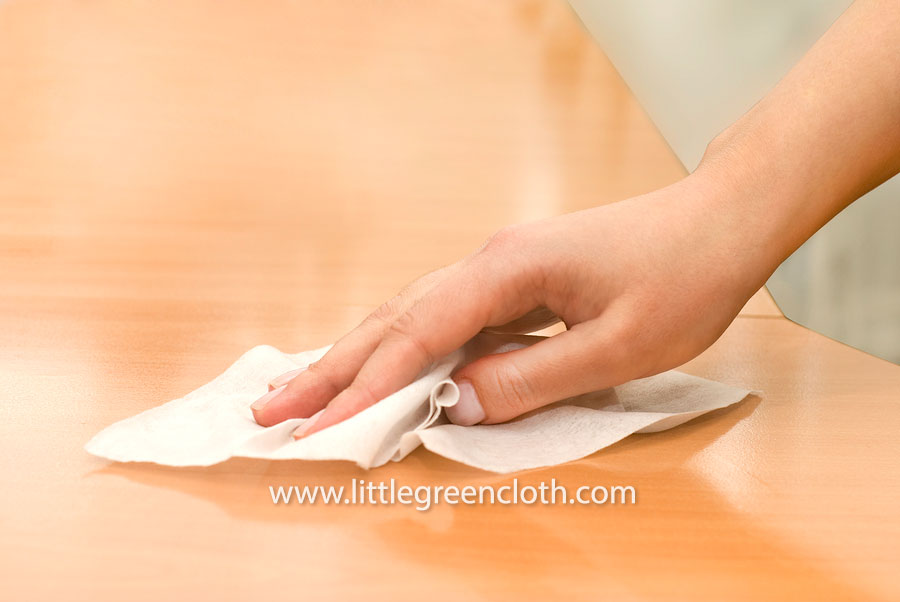Antibacterial wipes are very common these days, and can be found almost anywhere.
Your favorite grocery store is most likely dispensing them for wiping down carts, your local gym may have them on hand for cleaning exercise equipment, and your school may be handing them to schoolchildren to scrub their tables and chairs. I was shocked to find that our local elementary school requested that each child bring antibacterial wipes as a “school supply.” These “convenient” products have hidden hazards that should worry us, in addition to the fact that they are disposable, thus creating throwaway garbage.
What are they made from?
The most common ingredients present in these products are quaternary ammonium compounds, or “quats” for short, and chemicals such as alky dimethyl benzyl ammonium chloride and benzalkonium chloride. The American Medical Association (AMA) discourages manufacturers use of antibacterial compounds in consumer products as they can contribute to the development of antibiotic resistant bacteria. Additionally, the Association of Occupational and Environmental Clinics, a leading international organization on asthma, considers these harmful chemical compounds to be what they call “asthmagens” that trigger asthma attacks in people even if they haven’t presented with the illnesses previously. Actual studies revealed that the multitude of fragrances emitted by antibacterial wipes are composed of untested chemicals like phthalates and synthetic musks which are considered to be hormone disruptors and whose use can lead to hormonal disorders.
Reports from studies organized in the United Kingdom stated that antibacterial wipes commonly used in hospitals to kill otherwise harmful infections were actually responsible for the spreading of drug-resistant bacteria. The research was presented at a conference organized by an American Society of Microbiology in Boston, USA. The discussion concentrated on bacteria such as methicillin-resistant staphylococcus aureus or MRSA and VRE, or Vancomycin-resistant Enterococcus, both which have been associated with outbreaks of hospital-acquired (nosocomial) infections.
What are the health experts saying?
Public health experts have warned over the years that the overuse of antibacterial agents could lead to the buildup of resistance in microorganisms. Hospital staff were advised to refrain from using already contaminated wipes on other surfaces as these spread the drug-resistant bacteria. The chemical wipes can also harm the skin because of strong chemicals and wearing gloves during use is important. Proper use including throwing away used antibacterial wipes and using new ones for each job. In less vulnerable places, such as homes, it is advisable not to use antibacterial wipes but use ordinary soap and water, or try the Norwex Enviro Cloth or Travel Enviro Cloth.
What about hand sanitizers?
Even hand sanitizers can often contain dangerous chemicals. Triclosan, also present in antibacterial wipes, is the major component of hand sanitizers and can weaken the immune system and allow yeast to grow. When exposed to sunlight and ultra-violet rays, triclosan is converted to dioxin which is one of the leading causes of cancer and reproductive system disorders. Healthier alternatives include using ordinary soap with water, trying organic and natural alternatives or water and a travel sized Norwex enviro cloth. Using a natural product, or water with Norwex, can help prevent the rapid growth of drug-resistant bacteria. Using these more natural methods can help keep your family healthy while contributing to a healthier environment.
While wipes can contribute to the resistant bacteria problems; it is the liberal use of antibiotics, introduced in the 1950’s, that contributed to the development of a new strain of “super bacteria” or “super-bugs”. Super-bugs can cause life-threatening diseases and are antibiotic resistant**. Rational use of antibiotics and proper, limited use of cleaning chemicals and antibacterial wipes may reduce the chances of development of antibiotic-resistant bacteria.
What can you do?
Every small change that you can make to move toward a more natural way of living helps both your family’s health and the environment. Sometimes a little “dirt” may be good for us. When we try to create a sterile and clean, germ-free home by using antibacterial wipes and soaps, the truth is that we may be actuallypromoting the growth of much worse bacteria that could become immune to antibacterial compounds.
I encourage you to take some time to think about what “easy” changes you can make in your home.
Consider:
- Eliminating the hand sanitizer in your handbag or car in favor of old fashioned hand washing with soap and water. You could also carry a Norwex travel enviro cloth and clean your hands with that when you are on the go.
- Talking to your child’s teacher about the dangers of antibacterial wipes being used in the classroom. Encourage him or her to read the back of the bottle of the antibacterial wipes. You will often find that it states quite clearly “hazardous to humans and domestic animals.” Ask the teacher to consider alternatives that would be less dangerous for the children, such as using a natural cleanser or a Norwex enviro cloth and water.
- Replace the antibacterial hand soaps in your kitchens and bathrooms with more natural options like the Norwex Dishwashing Liquid and Norwex’s Peppermint Foaming Hand Wash. The foam soap is one of my favorite Norwex products.
Thanks for taking the time to consider the dangers associated with common household antibacterial wipes and some ideas for a healthier home. If you have questions, please feel free to contact me at any time. I would love to hear from you. You can also Follow Me on Facebook or Pinterest.
~ Suzanne
References:
www.momgrind.com
www.redorbit.com
www.erg.org
* http://en.wikipedia.org/wiki/Antibiotic_resistance
**(Antibiotic resistance is a form of drug resistance whereby some (or, less commonly, all) sub-populations of a microorganism, usually a bacterial species, are able to survive after exposure to one or more antibiotics; pathogens resistant to multiple antibiotics are considered multidrug resistant (MDR) or, more colloquially, superbugs. People do not develop resistance to antibiotics. *)






I have read that about hand sanitizers being bad for you and I haven’t used one in as long as I can remember. I like soap and water, it smells clean and doesn’t sting any small paper cuts that I might have.